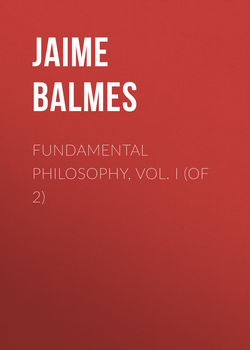Читать книгу Fundamental Philosophy, Vol. I (of 2) - Balmes Jaime Luciano - Страница 15
BOOK FIRST.
ON CERTAINTY
CHAPTER XIV.
IMPOSSIBILITY OF FINDING THE FIRST PRINCIPLE IN THE IDEAL ORDER
Оглавление138. We shall in vain seek in the region of ideas for that which we could not find in that of facts, for there is no ideal truth, the origin of all other truths.
Ideal truth only expresses the necessary relation of ideas, abstracting the existence of the objects to which they relate: hence it follows, first of all, that ideal truths are absolutely incapable of producing the knowledge of reality.
No ideal truth can lead to any result in the order of existences, unless there be some fact to which it applies. Otherwise, however fruitful it may be in the order of ideas, it will be absolutely sterile in that of facts. The fact without the ideal truth remains in its isolated individuality, incapable of producing any thing more than cognition of itself: but in return, the ideal truth, apart from the fact, remains purely objective in the logical world, and has no means of descending to that of existences.
139. Let us apply this doctrine to the most certain and most evident ideal principles, to those which contain the most general ideas, and which ought, therefore, to possess the fecundity in question, if, indeed, it be anywhere to be encountered.
"It is impossible for the same thing to be and not be at the same time." This is the famous principle of contradiction, which may undoubtedly claim to be regarded as one source of truth to the human understanding. The ideas contained in it are the clearest and most simple conceivable; in it is affirmed the repugnance of being to not-being, and of not-being to being, at the same time, which is most evident. But what advance can we make with this principle alone? Present it to the most penetrating mind, to the most powerful genius; leave them alone with it, and there will result only a sterile, although pure and most clear intuition. Since it does not affirm that any thing is or is not, nothing can be inferred either for or against any existence: it only offers to the mind this conditional relation: that if any thing does exist, it is repugnant for it not to exist at the same time that it exists, or to exist at the same time that it does not exist. But if the condition of existence or non-existence be not given, yes and no in the real order are indifferent; nothing is known concerning them, however great the evidence in the ideal order.
To pass from the logical world to that of reality, all that is required is a fact to serve as a bridge. If this fact be offered to the understanding, the two banks are joined, and science commences. I feel, I think, I exist: these are facts of consciousness; combine any one of them with the principle of contradiction, and what before were sterile intuitions become prolific ratiocinations, embracing at once the world of ideas, and that of reality.
140. Even in the purely ideal order, the principle of contradiction is sterile unless joined with particular truths of the same order. In geometry, for example, it is often argued thus: such a quantity is either greater or less than another, or equal to it; for otherwise it would be both greater and less, equal and unequal, at the same time, which is absurd. Here the principle of contradiction is effectively applied, not alone, but together with a particular truth which makes such an application available. Thus, in the above argument, no use could be made of the principle of contradiction, to prove equality or inequality were not the existence or non-existence of one of the two previously proved or supposed: since this neither does nor can result from the principle of contradiction which includes, not a particular idea, but the most general ideas presented to the human mind.
141. General truths, of themselves, even in the purely ideal order, lead to nothing, because of the indeterminateness of the ideas which they contain; and, on the other hand, particular truths of themselves produce no result, because they are limited to what they are, making reasoning, which cannot take one step without the aid of general ideas and propositions, impossible. Light results from the union of one with the other; separated they afford only an abstract and vague intuition, or the contemplation of a particular truth, which, limited to a contracted sphere, can give no knowledge of beings considered under a scientific aspect.
142. We shall see when we come to treat of ideas, that our mind has two very distinct classes of them; the one supposes space, and cannot abstract it, such are all geometrical ideas: the other does not relate to space, and includes all non-geometrical ideas. These two orders of ideas are separated by an impassable abyss, if the two orders are not approximated by a simultaneous use of both. The ideal order is not complete without this approximation; and the real order of the universe is turned into a chaos, or rather disappears, if real and ideal truths are not combined, in both the geometrical and non-geometrical orders. From all geometrical ideas imaginable, considered in all their ideal purity, nothing would result for the ideal non-geometrical order, for the world of material, much less of immaterial realities; and, on the other hand, from non-geometrical ideas alone we could not get so much as the idea of a right line. This observation shows that there is for us in the ideal order no one truth, the origin of all other truths; for if we take the geometrical order, we are limited to those combinations which do not go out of it; if the non-geometrical order, we lack the idea of space, without which we lose even the possibility of conceiving the corporeal world.(14)
